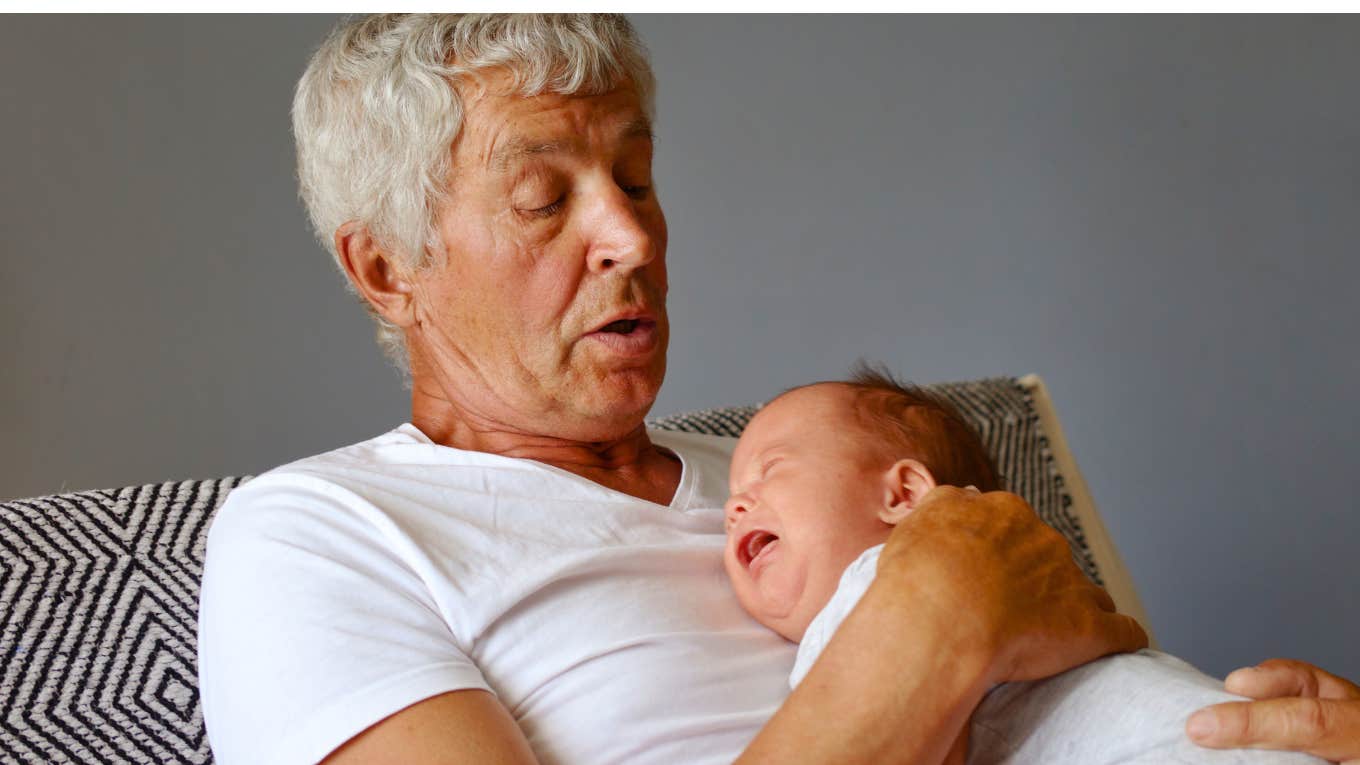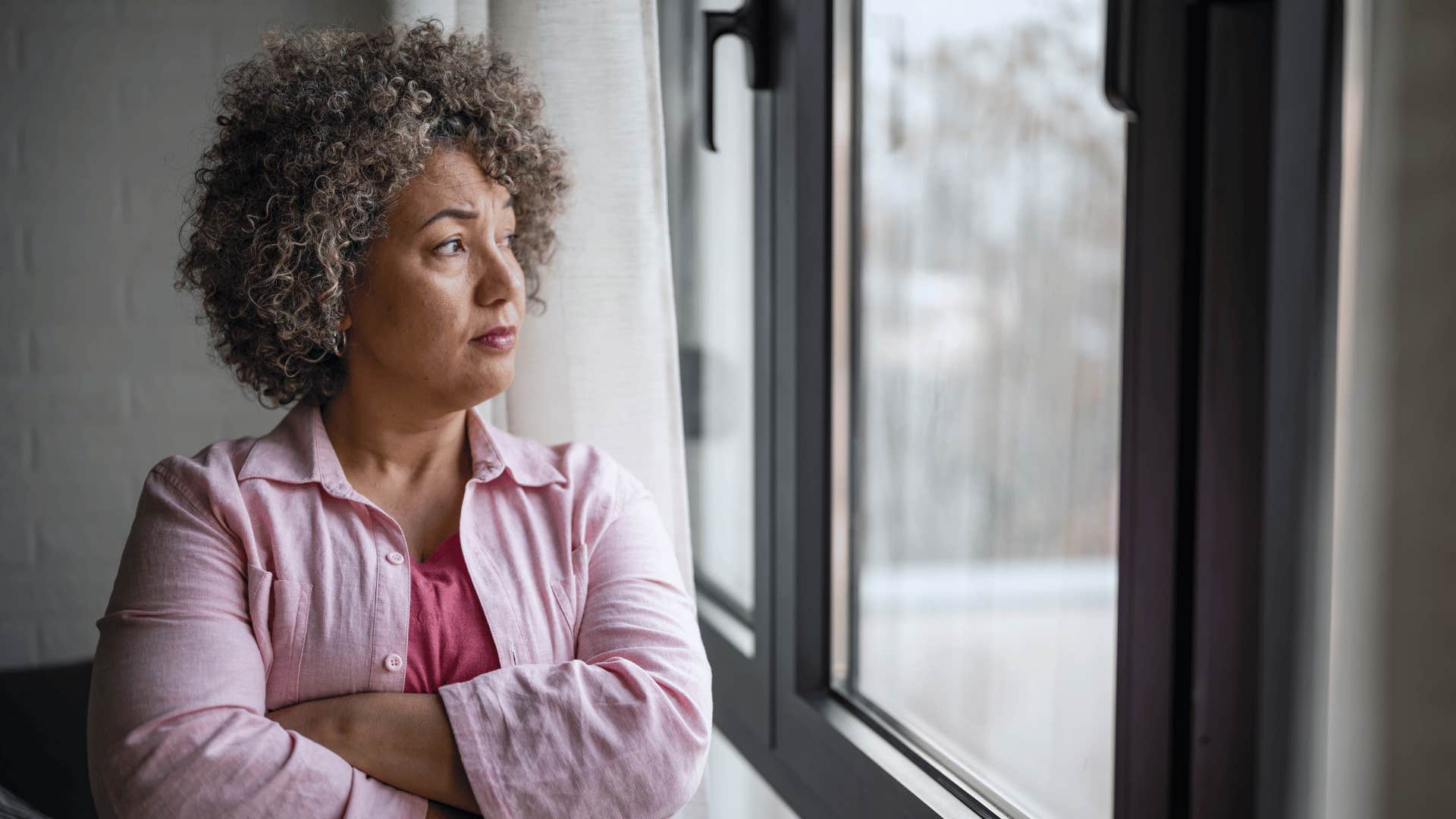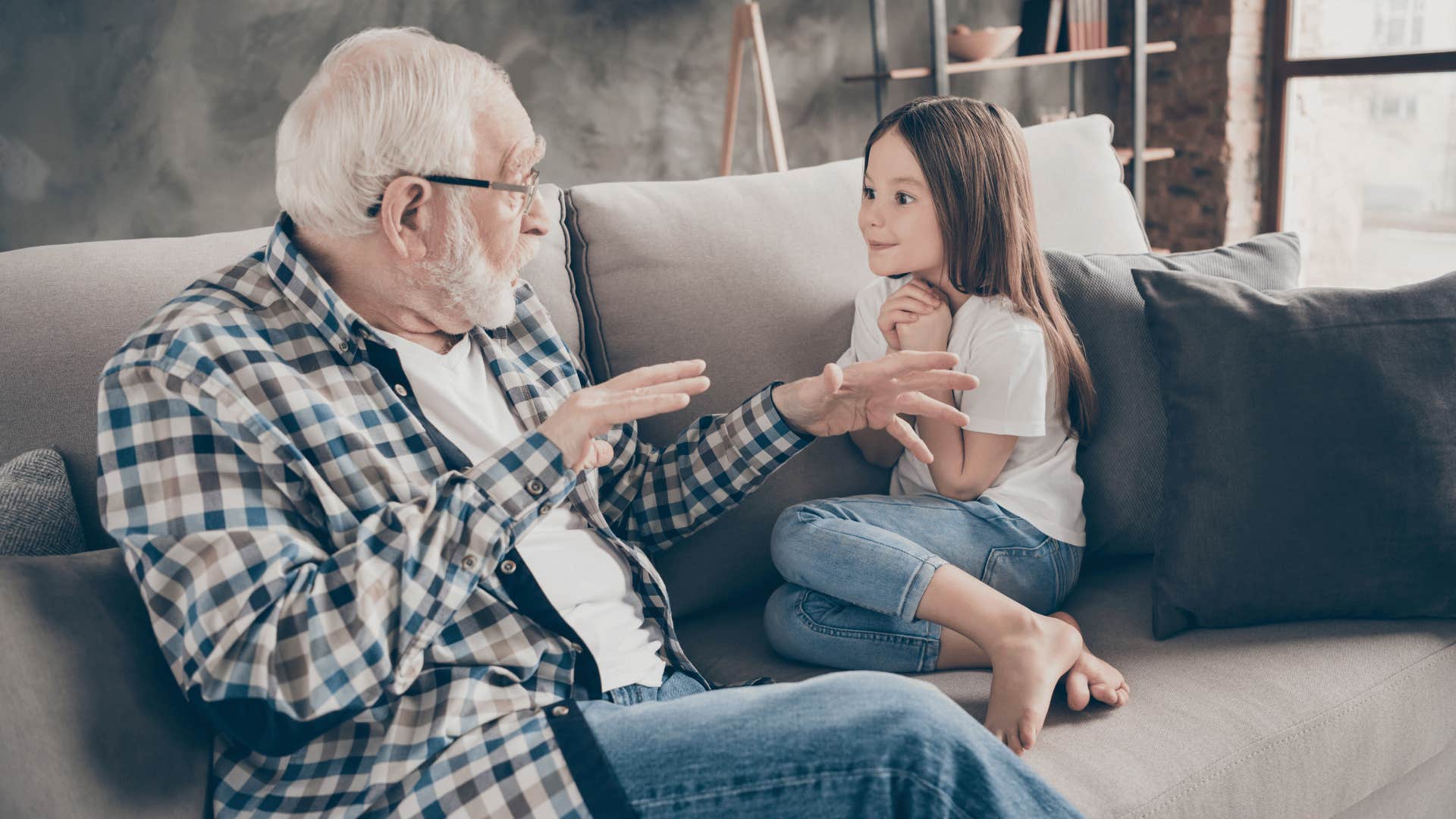10 Types Of People Who Make Not-So-Great Grandparents
Folks with personalities like this simply are not cut out for grandparenting duty.
 StoryTime Studio / Shutterstock
StoryTime Studio / Shutterstock Being a parent is a lifelong journey, and one part of that journey that's especially joyful comes when your kids announce that you’re going to be a grandparent. Yet oftentimes, the idea of being a grandparent is easier than actually doing the work of being a fully present grandparent. Much like parenting, being a grandparent isn’t something that comes naturally to everyone, and there are certain types of people who make very bad grandparents.
If you’re preparing to welcome a grandchild into the world, spend time thinking about the kind of grandparent you’d like to be. Consider your own needs and ask your kids about their expectations for you as a grandparent. Becoming a grandparent can be a healing and magical experience, but it takes conscious effort and careful consideration of how you want to show up.
Here are 10 types of people who make bad grandparents
1. Critical people
 fizkes | Shutterstock
fizkes | Shutterstock
Critical people make very bad grandparents. They seem to always have a comment ready to cut down their kids' parenting style, noting that when they first became parents, they never had trouble nursing them or getting them to sleep. Critical people tend to judge others according to impossibly high standards, which means everyone always falls short of their expectations.
Critical people don’t stop at criticizing their kids’ parenting. Their critical cup always runs over and they end up judging their grandkids as well. They criticize them for not walking already or for crying when their mom leaves the room. They criticize them for not getting straight As in school or not making varsity soccer. No matter what their grandkids do, it’s never good enough for critical people. Their love is fairly conditional, which is why they make very bad grandparents.
2. People who can’t say ‘no’
 fizkes | Shutterstock
fizkes | Shutterstock
People who can’t say “no” make very bad grandparents. Their unwillingness to set limits or tell their grandkids that they can’t do something establishes a porous boundary system that can be emotionally harmful over time.
Kids need to hear “no.” It makes them feel secure and it teaches them how to exist in a world that is often, sadly, unsafe. Without “no,” kids never learn that running into traffic can hurt them. Without “no,” they think they deserve to get whatever they want, which sets them down the path to extreme entitlement.
Having people-pleasing tendencies makes it hard for people to say that magic word, especially to their grandkids, who they love dearly and want to give the world to. Yet in reality, saying “no” is an act of love, as psychotherapist Merle Yost points out.
“Most people have enormous guilt and shame about saying no,” he shares. “But ‘NO’ is an essential boundary tied to self-care, productivity, and a happy life.”
If grandparents (and parents) don’t say “no,” to kids, it sends the message that “no” is a bad word. Avoiding the use of “no” is poor modeling, as it teaches kids to disregard their own limitations in favor of meeting other people’s needs.
3. People who play favorites
 Lordn | Shutterstock
Lordn | Shutterstock
People who play favorites make very bad grandparents, because playing favorites is the opposite of giving kids unconditional love and support. Kids are more aware than adults think they are, which means they notice the little things. They’ll know when their grandparents like their sibling more, which will lead them to resent everyone involved.
Playing favorites can diminish a child’s sense of self-worth. It raises their inner critic’s voice to an unbearably high volume, so that all they hear is that cruel hiss of, “You’re not the favorite child. You’ll never be enough.”
A good grandparent treats their grandkids equally, giving the same effusive amount of affection to one grandchild as to another. But a bad grandparent is one who plays favorites, setting an imbalanced dynamic that causes inevitable harm.
4. Emotionally distant people
 Julia Zavalishina | Shutterstock
Julia Zavalishina | Shutterstock
People who are emotionally distant make very bad grandparents. By avoiding a deeper connection, they send a message to their grandkids that they’re not worth extending themselves for. Emotionally distant people tend to be cold-hearted people, as well, meaning they don’t show warmth or affection, which are things every kid needs not only to survive, but also to thrive.
The Gottman Institute references a 2010 study from Duke University which found that babies with affectionate and attentive moms grow into happier, less anxious, and more resilient adults. Physical affection is essential to children’s emotional and psychological development, yet being emotionally connected requires more than cuddles. It means listening to kids when they speak and validating how they feel and what they say. It means taking the time to be fully present with them, which makes them feel seen, held, and ultimately loved.
5. People who push boundaries
 Roman Samborskyi | Shutterstock
Roman Samborskyi | Shutterstock
People who push boundaries make very bad grandparents. In their unwillingness to listen to the limitations that parents set for their own kids, they show an inherent lack of respect and understanding that their grandkids are not theirs to control.
As therapist Eli Harwood points out, a grandparent who ignores reasonable requests is one who has major trouble with boundaries. “When a grandparent continues to fixate on a topic or dynamic you have previously addressed, likely, they have not developed the skill of respecting boundaries,” she explains.
“We can tell someone can handle boundaries when they receive our feedback or limits with clear communication and changes in behavior,” Harwood notes, yet a boundary pusher will always try to find a loophole or have some excuse as to why they can’t (read: won’t) honor your request.
6. People with narcissistic tendencies
 Studio Romantic | Shutterstock
Studio Romantic | Shutterstock
People with narcissistic tendencies make very bad grandparents because their focus is always on their own needs, which makes them incapable of giving to others. They might like the idea of being a grandparent, but when it comes time to actually show up, they don’t have the tools to do so. Their need for admiration makes it nearly impossible for them to create a truly meaningful relationship with others, even their own grandchildren.
Marriage and family therapist Dan Neuharth points out how narcissistic behavior differs from healthier behavior, noting that “Narcissists lack empathy, healthy people care about the needs and feelings of others.”
“Narcissists value attention,” he continues. “Healthy people value connection.”
A narcissistic person will tell people how wonderful it is to be a grandparent, but they don’t perform any of the emotional labor involved in actually getting to know their grandchildren as individuals.
“Narcissists have one-way, superficial relationships, healthy people have reciprocal relationships,” Neuharth concludes.
7. Overprotective people
 Perfect Wave | Shutterstock
Perfect Wave | Shutterstock
Overprotective people make very bad grandparents. While their impulse to protect their grandchildren from danger comes from a good place, removing any form of discomfort or struggle can hinder their development and sense of independence.
Research from the American Psychological Association revealed the negative impacts of helicopter parenting, which can be applied to grandparenting, as well.
“Our research showed that children with helicopter parents may be less able to deal with the challenging demands of growing up,” Nicole Berry, the study’s lead author stated. She noted that micromanaging kids creates an environment where they don’t learn to regulate their own emotions, which doesn’t serve them well later in life.
“Parents can also set good examples for their children by using positive coping strategies to manage their own emotions and behavior when upset,” Berry concluded.
A good grandparent knows that guiding kids through their emotions is the most important thing they can offer, and they know that sometimes, stepping back is the best way to help their grandchildren grow.
8. Permissive people
 Evgeny Atamanenko | Shutterstock
Evgeny Atamanenko | Shutterstock
Many grandparents have the totally natural instinct to want to spoil their grandchildren, but permissive people take that too far, and they make very bad grandparents. People who let their grandchildren do whatever they want set them up for failure, because the reality of life is that we actually can’t get everything we want, all the time.
Permissive people indulge their grandkids every whim. They stuff them full of ice cream, they buy them every toy they ask for, and they let them have as much screen time as they want, without their parents’ consent.
Their permissive behavior is rooted in love, but it’s a dangerous path to forge, as being permissive can create a major sense of entitlement in children.
9. People who are ‘fixers’
 Chay_Tee | Shutterstock
Chay_Tee | Shutterstock
People who are “fixers” and want to smooth out their grandchildren’s experiences make very bad grandparents. Their impulse to make everything easy and perfect does more harm than good, in the long run, since kids need to learn to face challenges with grace and manage their more difficult feelings.
Psychologist Nick Wignall revealed that emotionally stable people accept painful emotions. “Just because a feeling is painful doesn’t mean it’s bad or that you are bad for feeling that way,” he explains.
Grandparents who try to fix their grandchildren’s emotions essentially teach them that they shouldn’t feel anything other than happy.
“If you get in the habit of treating your emotions as bad things by avoiding them, you train your brain to be afraid of how you feel,” Wignall continues. “And that’s a terrible setup for long-term emotional suffering and instability.”
“Just because it feels bad doesn’t mean it is bad,” he concludes.
10. Unreliable people
 Jacob Lund | Shutterstock
Jacob Lund | Shutterstock
Unreliable people make very bad grandparents. Their inability to keep their word leads to inevitable disappointment, and it teaches their grandkids not to trust them. Unreliable people make promises they have no intention of keeping. They say they’ll come watch their granddaughter’s gymnastics meet or sit in the front row during her piano recital, but then, at the last minute, something always comes up.
Unreliable people lack follow-through, which is an unhelpful and hurtful trait for a grandparent to have. Psychologist Sheryl Ziegler shares that responsive parenting is one of the most effective parenting styles, and that holds true for grandparents, as well.
Being responsive “implies you are accepting of where your child is at any given time and are sensitive to their needs,” she explains. “The responsive parent looks past what appears to be happening and attunes to what their child needs.”
Responsive people show up for their loved ones, while unreliable people don’t, and that makes them very bad grandparents.
Alexandra Blogier, MFA, is a staff writer who covers psychology, social issues, relationships, self-help topics, and human interest stories.

